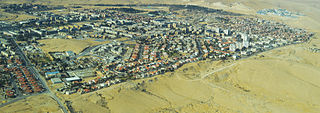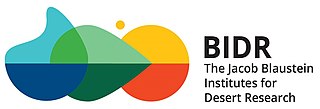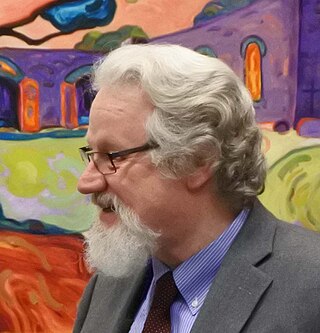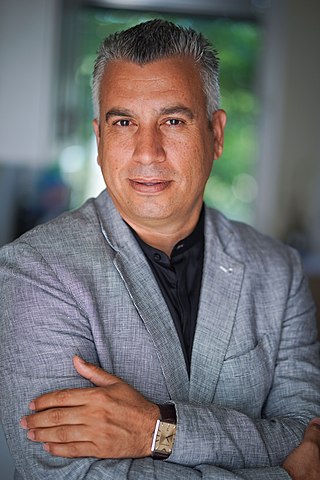
David Faiman (born 1944 in the United Kingdom) is a British and Israeli physicist.

David Faiman (born 1944 in the United Kingdom) is a British and Israeli physicist.
Faiman was educated at Willesden County Grammar School and the University of London, and received his Ph.D from the University of Illinois in 1969. After post-doctoral appointments in Oxford and CERN he arrived in Israel in September 1973, to take up an appointment in theoretical physics at the Weizmann Institute of Science. However, as a result of the energy crisis that followed the Yom Kippur War, he re-directed his research interests from elementary particles into solar energy. In 1976 he was recruited by Amos Richmond to assist in founding the Jacob Blaustein Institutes for Desert Research at the Sede Boqer campus of Ben-Gurion University of the Negev. [1] [2] Faiman created the Institutes’ Department of Solar Energy & Environmental Physics, which he headed concurrently with the Ben-Gurion National Solar Energy Center until his retirement in 2013 at the rank of Professor Emeritus. Faiman lives in Sede Boqer, Israel, in a passive solar house where almost all of the heating and cooling needs are taken care of by the sun. His hobbies include biblical geography, and the music of Giacomo Meyerbeer.
Faiman’s theoretical physics research focused on hadron spectroscopy using the quark model and various associated symmetries. His solar energy research spanned studies of solar radiation, energy conversion devices, and power-producing systems. His most celebrated work was the development, in collaboration with the Zenith Solar Company, of a 10 m2 mirrored, sun-tracking dish, which concentrated the sun’s rays 1,000 times onto a water-cooled solar array of dimensions 100 cm2. [3] [4] Under full sunshine, this system generated 2 kW of electric power and 5 kW of thermal power, the latter in the form of hot water at 80oC. [5] Faiman was Israel’s representative on solar energy to UNESCO, the FAO and Tasks 2 and 8 of the International Energy Agency. Within the latter framework he co-authored the series of books Energy from the Desert.

Dimona is an Israeli city in the Negev desert, 30 kilometres (19 mi) to the south-east of Beersheba and 35 kilometres (22 mi) west of the Dead Sea above the Arava valley in the Southern District of Israel. In 2021 its population was 35,892. The Shimon Peres Negev Nuclear Research Center, colloquially known as the Dimona Reactor, is located 13 kilometres (8.1 mi) southeast of the city.

The Negev or Negeb is a desert and semidesert region of southern Israel. The region's largest city and administrative capital is Beersheba, in the north. At its southern end is the Gulf of Aqaba and the resort city and port of Eilat. It contains several development towns, including Dimona, Arad, and Mitzpe Ramon, as well as a number of small Bedouin towns, including Rahat, Tel Sheva, and Lakiya. There are also several kibbutzim, including Revivim and Sde Boker; the latter became the home of Israel's first Prime Minister, David Ben-Gurion, after his retirement from politics.

Ben-Gurion University of the Negev (BGU) is a public research university in Beersheba, Israel. Ben-Gurion University of the Negev has five campuses: the Marcus Family Campus, Beer Sheva; the David Bergmann Campus, Beer Sheva; the David Tuviyahu Campus, Beer Sheva; the Sede Boqer Campus, and Eilat Campus.

Midreshet Ben-Gurion, also known as Midreshet Sde Boker, is an educational center and boarding school in southern Israel. Located in the Negev next to kibbutz Sde Boker, it falls under the jurisdiction of Ramat HaNegev Regional Council. In 2021 it had a population of 1,955.

Avishay Braverman is an economics professor, politician, and Israeli public figure. Having held senior positions as economist at the World Bank, he was later elected as fifth president of the Ben-Gurion University of the Negev (1990-2006). As a Knesset member on behalf of the Labor Party (2006-2015) he served as Minister of Minority Affairs, Chairman of the Knesset Finance Committee and Chairman of the Knesset Economic Affairs Committee. Israel Prize laureate in 2020 for Lifetime Achievement, for his work as president of Ben-Gurion University.

The Jacob Blaustein Institutes for Desert Research (BIDR) constitute one of the academic faculties of Ben-Gurion University of the Negev (BGU), and are located on BGU's Sede Boqer Campus in Midreshet Ben-Gurion in the heart of the Negev Desert in Israel. The BIDR is home to approximately 70 academic faculty and 90 technical and administrative staff members. In addition, 220 graduate students and 50 post-doctoral scholars, coming from over 30 different countries, study at the BIDR within the framework of the Albert Katz International School for Desert Studies. The BIDR comprises three internationally recognized research institutes: the Zuckerberg Institute for Water Research, the French Associates Institute for Agriculture and Biotechnology of Drylands, and the Swiss Institute for Dryland Environmental Research. The stated mission of the BIDR is to combat desertification and to explore global challenges by bringing together water, food, energy, and environmental research.

The Albert Katz International School for Desert Studies (AKIS) is an international graduate school situated within the Jacob Blaustein Institutes for Desert Research, which is part of Ben-Gurion University of the Negev. It is located in Midreshet Ben-Gurion in the heart of the Negev Desert in Israel and was established in 1999.

Ashalim is a small community settlement in southern Israel. Located in the Negev desert about 35 km south of Be'er Sheva and on the eastern side of Nahal Besor, the largest stream in the Negev, it falls under the jurisdiction of the Ramat HaNegev Regional Council. In 2021 its population was 681. Nearby settlements include Ezuz and Nitzana.
Moshe Rudolf "Rudi" Bloch was an Israeli scientist.

Tirabin al-Sana, also Tarabin, is a Bedouin village in the Negev desert in southern Israel. The village was built for the Tarabin tribe. Located near Rahat and Mishmar HaNegev, it falls under the jurisdiction of al-Kasom Regional Council. In 2021 it had a population of 1,240.

Tuvia Friling is an Emeritus professor at Ben-Gurion University of the Negev, Israel. Previously he served as a senior researcher at the Ben-Gurion Research Institute for the Study of Israel and Zionism and a lecturer at the Israel Studies Program both at Ben-Gurion University of the Negev.

The Ben-Gurion National Solar Energy Center at Midreshet Ben-Gurion is the national alternative energy research institute of Israel. It was established in 1987 by the Ministry of National Infrastructures to study promising alternative and clean energy technologies, particularly those involving solar power. Since July 1991, the center has been operated by Ben-Gurion University of the Negev's Jacob Blaustein Institutes for Desert Research. Its director is David Faiman.

Harry Zvi Tabor was an Israeli physicist. He is known as the father of Israeli solar energy. He is generally credited with having brought Israel's solar energy program to international prominence.
Zenith Solar was an Israeli solar energy company based in Ness Ziona.

The use of solar energy began in Israel in the 1950s with the development by Levi Yissar of a solar water heater to address the energy shortages that plagued the new country. By 1967 around 5% of water of households were solar heated and 50,000 solar heaters had been sold. With the 1970s oil crisis, Harry Zvi Tabor developed the prototype of the solar water heater now used in over 90% of Israeli homes. There are over 1.3 million solar water heaters installed as a result of mandatory solar water heating regulations.

The Nancy and Stephen Grand Technion Energy Program (GTEP) or Grand Technion Energy Program was established in 2007 at Technion - Israel Institute of Technology, which is Israel's first university, founded in 1912.
Donald Blair Melrose FAA is an Australian theoretical physicist, Rhodes Scholar and laureate of the Chandrasekhar prize in Plasma Physics.

Marc Eugene Schiler is a professor of the USC School of Architecture at the University of Southern California. He is a Fellow of the American Solar Energy Society and a winner of the Passive Solar Pioneer award in 2015. Schiler completed an undergraduate degree in architecture at USC School of Architecture and a Master of Architecture at Cornell University. He was an assistant professor of Architecture and Landscape Architecture at Cornell for four years prior to returning to USC in 1982. He was invited for a year to do research at the EMPA. He served as a Fulbright Senior Scholar to the Middle East in 2002–2003 at the Technion – Israel Institute of Technology, Haifa and the Ben-Gurion University of the Negev, Sede Boqer. He has published more than 100 peer-reviewed scientific papers and authored or edited six books on environmental controls.

Ashraf Brik is a full professor at the Schulich Faculty of Chemistry at the Technion Institute of Technology, Israel. His laboratory specializes in developing synthetic methods for chemical synthesis of proteins with post-translational modifications (PTMs) in quantities that allow for them to be studied thoroughly. Brik's group is developing novel modulators based on small molecules, peptides and peptidomimetics, to influence enzymes and proteins involved in various diseases. With the help of these tools, it is possible to understand how molecules and biological systems affect health.
The Zuckerberg Institute for Water Research (ZIWR) is one of three research institutes constituting the Jacob Blaustein Institutes for Desert Research, a faculty of Ben-Gurion University of the Negev (BGU). The ZIWR is located on BGU's Sede Boqer Campus in Midreshet Ben-Gurion in Israel's Negev Desert, and hosts researchers who focus on developing new technologies to provide drinking water and water for agricultural and industrial use and to promote the sustainable use of water resources. The ZIWR encompasses two departments: 1. the Department of Environmental Hydrology and Microbiology, and 2. the Department of Desalination and Water Treatment.